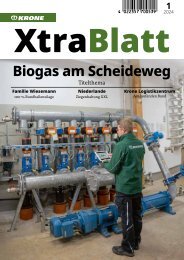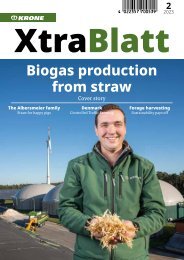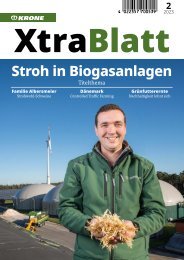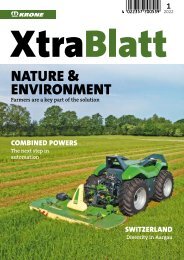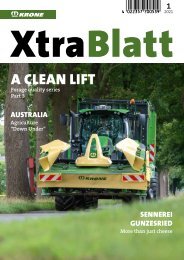XtraBlatt Issue 01-2023
You also want an ePaper? Increase the reach of your titles
YUMPU automatically turns print PDFs into web optimized ePapers that Google loves.
Krone’s strategy<br />
for sustainable<br />
development includes<br />
the generation of<br />
renewable energy on<br />
its own premises.<br />
Workplace safety,<br />
healthcare and<br />
reconciling work and<br />
family life are also<br />
considered key topics<br />
in the company’s<br />
sustainability policy.<br />
<strong>XtraBlatt</strong>: How do you interface with other<br />
areas of activity within the Krone Group?<br />
Philipp Sander: To best represent the three<br />
areas of the Sustainability Report, we have set up<br />
an internal sustainability team, which essentially<br />
comprises our head of Compliance (to verify the<br />
legal conformity, integrity and business ethics of<br />
all corporate activities), head of Human Resources<br />
and an assistant to the management board. Since<br />
the Krone Group’s environment-related issues<br />
are currently the main focus of my day-to-day<br />
business, I am in close contact with the energy<br />
and environmental officers at our Agricultural<br />
Machinery Division sites. In addition, I also work<br />
closely with our Corporate Strategy, Marketing<br />
and Purchasing departments as there are many<br />
overlaps in these areas. Another exciting aspect of<br />
my work is analysing start-up firms together with<br />
our investment management team – assessing<br />
them through the lens of sustainability...<br />
By summer <strong>2023</strong> we will<br />
have installed solar panels<br />
at all our sites. The total<br />
output will be around<br />
5.5 MWp.<br />
Philipp Sander, Sustainability Manager<br />
<strong>XtraBlatt</strong>: As an ordering party, is Krone<br />
also responsible for supplier compliance with<br />
sustainability requirements? And if so, how do<br />
you monitor that?<br />
Philipp Sander: Yes, but this is something<br />
that has be done together, as we emphasised<br />
at our recent supplier conference. We have the<br />
advantage that most of our suppliers come from<br />
Germany and so compliance with applicable<br />
standards relating to respecting human rights<br />
and working conditions is a given. However,<br />
when it comes to the use of critical raw materials<br />
and resource-friendly production methods, we<br />
like to warn our suppliers of future requirements<br />
well in advance, which helps them. We make an<br />
effort to develop personal relationships especially<br />
with our suppliers for our major product groups,<br />
so it is easier to share information on upcoming<br />
requirements and challenges. However, “critical”<br />
suppliers will undoubtedly have to undergo onsite<br />
audits in future. But I would like to stress that<br />
a sustainable primary industry, such as steel manufacturing,<br />
can make a major contribution to the<br />
sustainability of Krone products. In this respect,<br />
we are reliant on domestic politics to pave the way<br />
for a sustainable steel production in Germany<br />
and to provide manufacturers with the necessary<br />
support to adapt to these ever greater demands.<br />
<strong>XtraBlatt</strong>: To what extent does Krone see it<br />
as its duty to urge sales partners to operate<br />
sustainably?<br />
Philipp Sander: I would rather put it this way;<br />
we see it as our duty to reach out to our sales<br />
partners at an early stage of product development<br />
This is to develop joint solutions to meet the<br />
needs of contractors and farmers. Agriculture<br />
faces the enormous challenge of feeding more<br />
and more people on the same amount of land.<br />
This can only be done with the aid of high-tech,<br />
high-quality machines that are used with the<br />
utmost efficiency. So ultimately, from a sustainability<br />
perspective, the aim is to prevent soil<br />
compaction and provide support through digital<br />
processes. If we also manage to produce our machines<br />
in the most climate-friendly way possible,<br />
then so much the better.<br />
<strong>XtraBlatt</strong>: What steps is Krone taking to<br />
become more independent and sustainable in<br />
terms of energy?<br />
Philipp Sander: As well as observing energy<br />
efficiency criteria when making new and<br />
replacement investments, the energy supply to<br />
our factories is a major lever. We prioritise our<br />
actions here in the following order: we use our<br />
own land for power generation, we look for local<br />
partners for using renewable energy as well as for<br />
nationwide projects we can get involved in. By<br />
summer <strong>2023</strong> we will have installed solar panels<br />
at all our sites. The total output will be around<br />
5.5 MWp. However, the long-term challenge is to<br />
procure renewable electricity in low-wind conditions<br />
at night and to replace natural gas, which<br />
we currently use in the paint shop, for example. It<br />
remains to be seen which alternatives will prove<br />
economically viable in the coming years in this<br />
highly volatile market.<br />
<strong>XtraBlatt</strong>: In your view, how will sustainability<br />
within the Krone Group develop in perspective?<br />
Philipp Sander: Basically, I think that the concept<br />
of sustainability has always been in the DNA<br />
of a family business, because these companies are<br />
always thinking about the next generation and so<br />
act with foresight. But it’s also true that this theme<br />
has come increasingly to the fore in recent years.<br />
In essence, two topics will continue to be critical<br />
to the company’s success: customer satisfaction –<br />
hence the quality and price of our products – and<br />
the motivation of our staff.<br />
As far as the first topic is concerned, in terms<br />
of sustainability I regard resource efficiency,<br />
repairability and recycling as the key factors for<br />
long-term success. And it all starts with product<br />
development. Given the right political framework,<br />
I can also see wind power and hydrogen as major<br />
advantages for our Emsland factories. When it<br />
comes to motivating our staff, we must put the<br />
spotlight on fair remuneration, workplace safety,<br />
healthcare and reconciliation of work and family<br />
life. «<br />
From 2025, the<br />
sustainability report<br />
must provide transparent<br />
data on how<br />
much CO2 is emitted<br />
by the various Krone<br />
sites and the products,<br />
also how much waste<br />
is produced and how<br />
much water consumed<br />
by the sites.<br />
58 1|<strong>2023</strong> <strong>XtraBlatt</strong><br />
<strong>XtraBlatt</strong> 1|<strong>2023</strong><br />
59




